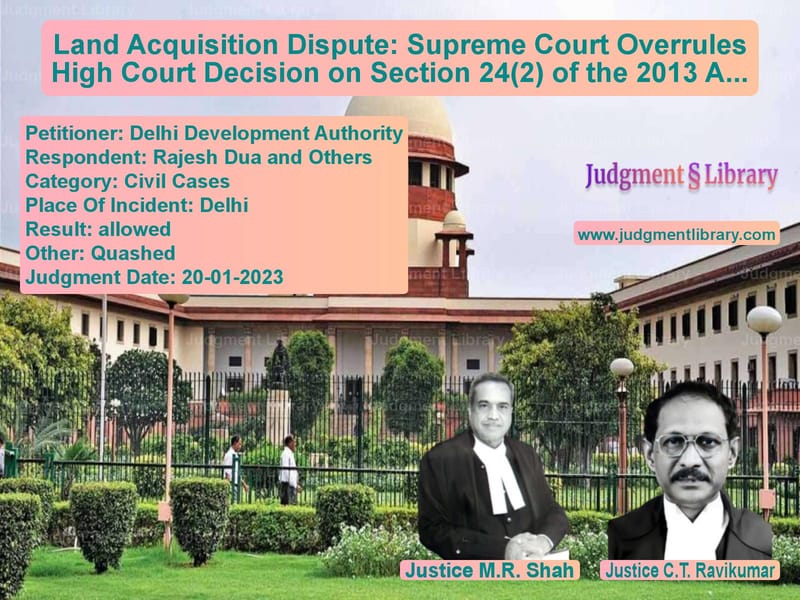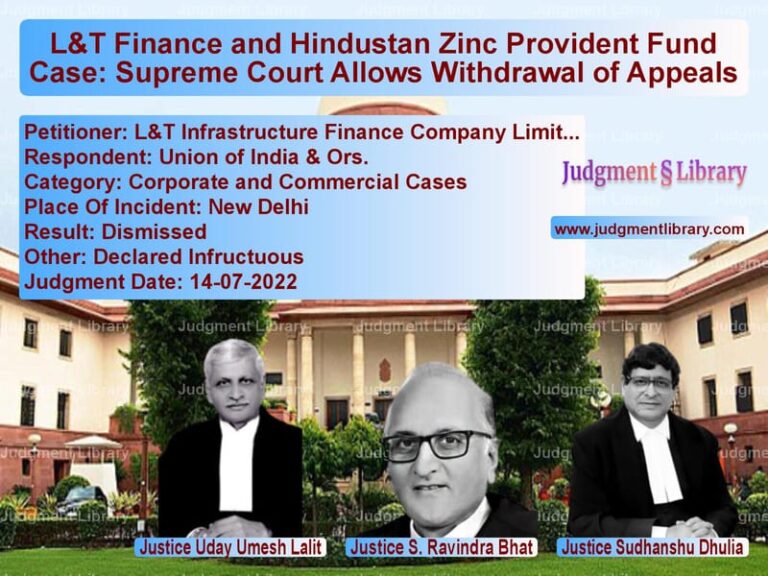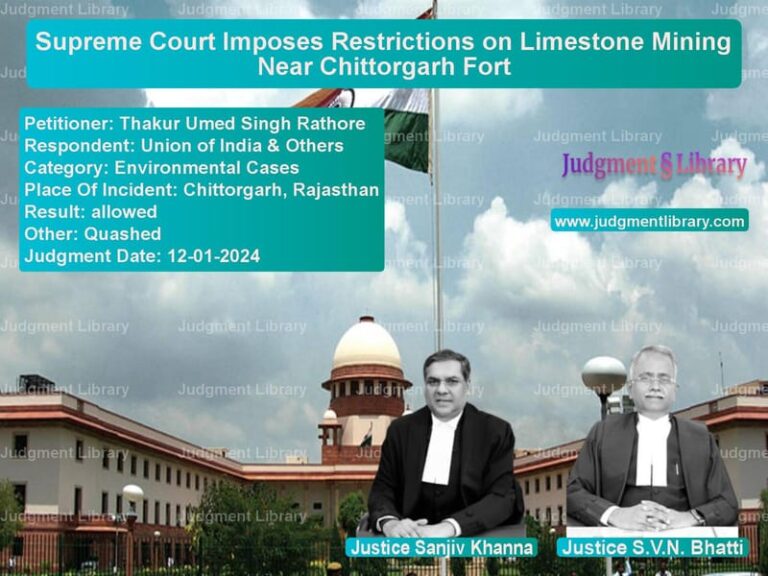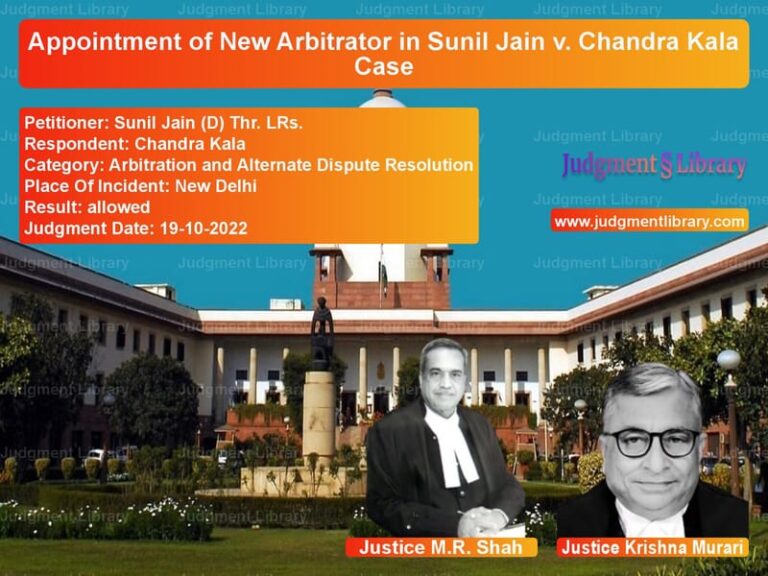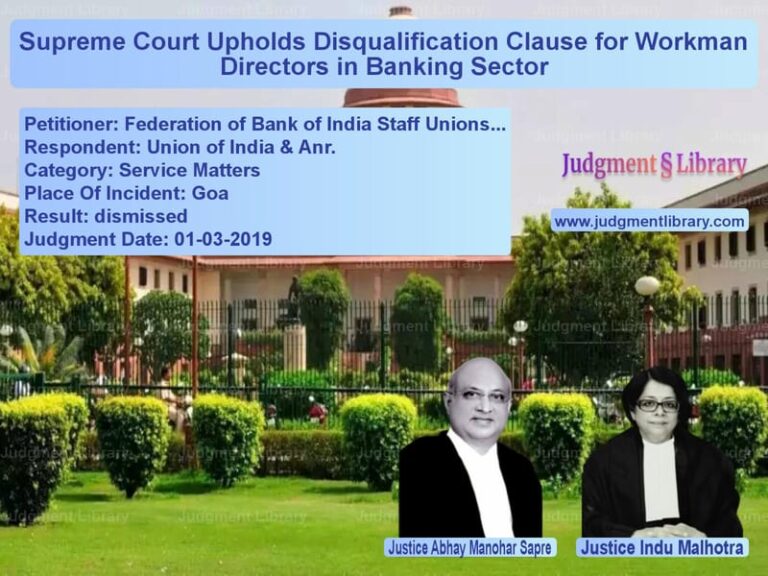Land Acquisition Dispute: Supreme Court Overrules High Court Decision on Section 24(2) of the 2013 Act
The Supreme Court of India recently delivered a significant judgment in the case of Delhi Development Authority (DDA) vs. Rajesh Dua and Others. This case examined whether land acquisition proceedings initiated under the Land Acquisition Act, 1894 had lapsed due to non-payment of compensation and failure to take physical possession under Section 24(2) of the Right to Fair Compensation and Transparency in Land Acquisition, Rehabilitation and Resettlement Act, 2013.
Background of the Case
The land in question was acquired in 1964, and the award was declared in 1967. According to the Land Acquisition Collector (LAC), possession of the land was taken in 1967 through a formal panchnama, and the compensation was deposited with the Reference Court. However, in 2017, the landowners (respondents) filed a writ petition before the Delhi High Court, arguing that the acquisition proceedings should be deemed to have lapsed since they had not received direct payment.
Read also: https://judgmentlibrary.com/dda-land-acquisition-upheld-supreme-court-overturns-high-court-ruling/
The High Court ruled in favor of the landowners, declaring that the acquisition had lapsed under Section 24(2) of the 2013 Act, citing its previous ruling in Smt. Harbans Kaur vs. Govt. of NCT of Delhi. The DDA, dissatisfied with this ruling, appealed to the Supreme Court.
Arguments by the Appellant (DDA)
- The DDA contended that the High Court erred in its interpretation of Section 24(2), as possession had already been taken and compensation deposited with the Reference Court.
- They relied on the ruling in Indore Development Authority vs. Manoharlal (2020), which clarified that depositing compensation in court satisfies the legal requirement.
- The High Court’s reliance on Pune Municipal Corporation vs. Harakchand Misirimal Solanki (2014) was misplaced, as that ruling had been expressly overruled by the Constitution Bench in the Indore Development Authority case.
Arguments by the Respondents (Landowners)
- The respondents argued that they had never received compensation directly and that merely depositing it in court did not satisfy the payment requirement.
- They maintained that no physical possession was taken, as they continued to occupy and use the land.
- They relied on past Delhi High Court rulings that held non-payment of compensation led to a lapse in land acquisition.
Supreme Court’s Observations
- “The decision in Pune Municipal Corporation is hereby overruled, and all other decisions based on it are also overruled.”
- “The word ‘or’ in Section 24(2) must be read as ‘nor’ or as ‘and’, meaning that lapse occurs only if neither possession has been taken nor compensation has been paid.”
- “Since possession was taken in 1967 and compensation was deposited with the Reference Court, there is no basis for claiming lapse of acquisition.”
- “The judgment in Indore Development Authority vs. Manoharlal (2020) is binding and must be followed.”
Final Judgment
- The Supreme Court set aside the High Court’s judgment and restored the validity of the land acquisition proceedings.
- The Court ruled that depositing compensation in the Reference Court fulfills the legal requirement under the Land Acquisition Act, 1894.
- The landowners’ plea for lapse of acquisition was rejected.
Legal Precedents Considered
- Indore Development Authority vs. Manoharlal (2020): Established that both possession and compensation must be lacking for acquisition proceedings to lapse.
- Pune Municipal Corporation vs. Harakchand Misirimal Solanki (2014): Previously held that compensation deposited in court does not amount to payment but was later overruled.
- Shiv Kumar vs. Union of India (2019): Confirmed that acquisition does not lapse if possession is taken or compensation is deposited.
Implications of the Judgment
- The ruling reinforces that land acquisition cannot be invalidated based solely on non-payment of compensation if it has been deposited in court.
- It prevents misuse of Section 24(2) by landowners seeking to invalidate long-standing acquisitions.
- The decision aligns future rulings with the Supreme Court’s Constitution Bench decision in Indore Development Authority.
- Government agencies can now rely on possession records and compensation deposits to defend against lapse claims.
Conclusion
The Supreme Court’s ruling upholds the principle that land acquisition proceedings do not lapse merely due to non-payment of compensation if possession has been taken. The judgment strengthens legal certainty in land acquisition matters and prevents unwarranted invalidations of acquisitions based on technicalities. The decision will have a significant impact on similar land acquisition disputes across India.
Petitioner Name: Delhi Development Authority.Respondent Name: Rajesh Dua and Others.Judgment By: Justice M.R. Shah, Justice C.T. Ravikumar.Place Of Incident: Delhi.Judgment Date: 20-01-2023.
Don’t miss out on the full details! Download the complete judgment in PDF format below and gain valuable insights instantly!
Download Judgment: delhi-development-au-vs-rajesh-dua-and-other-supreme-court-of-india-judgment-dated-20-01-2023.pdf
Directly Download Judgment: Directly download this Judgment
See all petitions in Property Disputes
See all petitions in Damages and Compensation
See all petitions in Judgment by Mukeshkumar Rasikbhai Shah
See all petitions in Judgment by C.T. Ravikumar
See all petitions in allowed
See all petitions in Quashed
See all petitions in supreme court of India judgments January 2023
See all petitions in 2023 judgments
See all posts in Civil Cases Category
See all allowed petitions in Civil Cases Category
See all Dismissed petitions in Civil Cases Category
See all partially allowed petitions in Civil Cases Category

